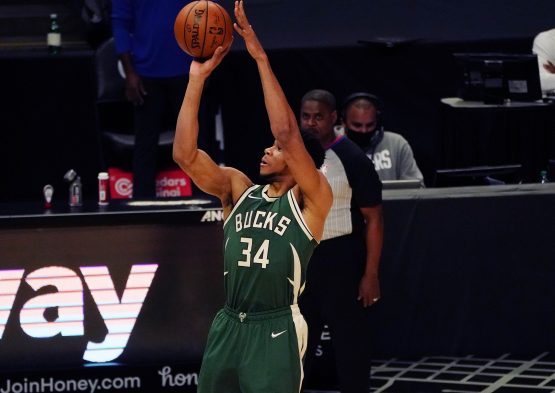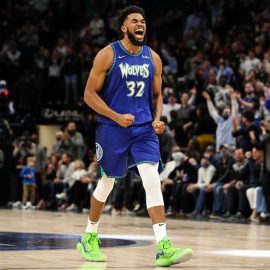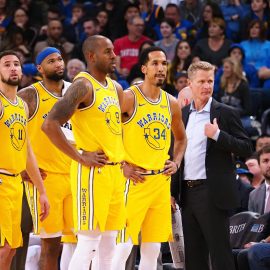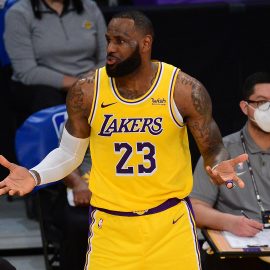The Denver Nuggets enter the 2016-17 season as a potential playoff candidate. If the Nuggets are going to reach that feat, Nikola Jokic will need to continue his meteoric rise to superstardom.
Look at the list of transactions made this offseason and you’ll see several teams at the bottom of the Western Conference making moves. The Minnesota Timberwolves improved on the bench with Tom Thibodeau and fifth overall pick Kris Dunn, the Dallas Mavericks added Harrison Barnes – for $94 million – and Andrew Bogut and the New Orleans Pelicans opted for improving their defense, adding E’Twaun Moore and Solomon Hill to go alongside Anthony Davis.
One team missing in the mix: The Denver Nuggets. Several players on the roster locked in for the 2016-17 season and three draft picks in the 2016 draft resulted in Denver’s absence in free agency. Outside of re-signing Darrell Arthur – one of my favorite contracts of the offseason – and jumping into the Dwyane Wade race with Milwaukee, the Nuggets remained dormant and decided to roll back the same cast of characters.
But can that result in a playoff run? Hoping their youth on the roster could grow and develop into a playoff team, the Nuggets are hoping to see an improvement from second-year guard Emmanuel Mudiay, third-year guard Gary Harris and good, healthy seasons from Danilo Gallinari and Wilson Chandler – the former missed 29 games, while the latter missed the entire season.
However, the most important player is second-year center Nikola Jokic.
On a team full of “X-Factors”, Denver’s chances of becoming a playoff team improve tenfold if Jokic can expand on his rookie season and take a step forward in his sophomore season. The 41st pick in the 2014 NBA draft, Jokic stayed overseas, playing with the Mega Leks of the Adriatic League before joining Denver last season. While rookies Karl-Anthony Towns, Kristaps Porzingis and Justise Winslow shined, Jokic’s season went largely under the radar.
But by season’s end, Jokic not only became one of the better rookies, but his performance resulted in him finishing third in Rookie of the Year voting.
Jokic’s per game averages of 10.0 points, 7.0 rebounds, 2.4 assists on 21 minutes per game didn’t do justice for how good Jokic was last season. Jokic finished with a 6.03 RPM in NBA’s Real Plus-Minus Statistic, good for ninth in the entire league. Finishing with positive offensive and defensive totals, Jokic flashed the ability to impact both sides of the floor, and even though he played less than half of an NBA game a night, Jokic had an effect on Denver’s overall statistics.
Offensively, Jokic was solid. Overall, Jokic finished with 51 percent shooting, but flashed a three-ball, knocking down 33 percent of his 84 attempts last season. Jokic’s value as a floor spacer flashed as he played alongside non-shooters like Mudiay and Kenneth Faried. He flashed as a roll man and finished in the 77th percentile as a rookie in post-up plays.
The 3.9 assists per 36 also suggested that Jokic could assume a larger role as secondary creator in his second season for Denver. Few big men in the league can move the ball like Jokic, putting him in a rare air with Al Horford, DeMarcus Cousins, and Marc Gasol. With him and Mudiay on the floor, the floor needs to be surrounded with shooters, so that their passing abilities could shine, resulting in some open looks.
The key to Denver and Jokic’s ascension is if he can take a step forward on the defensive end. Jokic was a good defender as a rookie, but the Nuggets finished 24th in defensive efficiency. By putting Jokic on the court more, that alone should turn the fortune around on that side of the floor for the Nuggets. Last season, Denver was nine points better on the defensive end with Jokic on the floor.
It was a solid effort that Jokic could build on in year two. Jokic finished allowing 0.81 points per possession on post-up plays and 0.86 on off screen plays, but struggled, allowing 1.06 on plays against roll men. He’s similar to fellow teammate Jusuf Nurkic in that he isn’t the most mobile big man in the league, yet, capable of defending away from the rim in spurts.
Part of that was the players that replaced Jokic on the floor, but even in a small sample, the numbers – both “basic” and “advanced” – suggest that Jokic was a factor in successful defensive possessions for the Nuggets last season.
You even saw some of the smarter lineups deployed having success. The lineup of Jokic, Mudiay, Gary Harris, Danilo Gallinari and Darrell Arthur finished with a net rating of 14.2 and a defensive rating of 99.2. The noise is loud in that lineup – just 97 minutes played last year – but it’s the perfect lineup for what Denver could use to maximize Jokic – a slashing point guard, a good defensive player alongside him in the frontcourt and three capable shooters around them.
The Denver Nuggets remain an interesting team to me. Outside of Kenneth Faried, I feel like they have the right veterans on the roster to fit the young nucleus they amassed over the last three seasons. A step forward from the right players, good health and the altitude should result in Denver pushing for one of the final two seeds in the Western Conference.
Truth be told, the Denver Nuggets are a team of X-Factors. Chandler and Gallinari’s health, the evolution of Harris and Mudiay as they continue to gain NBA experience, the lineup usage of head coach Michael Malone. All of these things – plus the impact from the rookies, though with so many players on the roster, it’s tough to imagine them getting a ton of minutes – could determine Denver’s playoff chances this year.
However, that rise, that move from a lottery team to a playoff team, starts with Nikola Jokic.
Add The Sports Daily to your Google News Feed!






